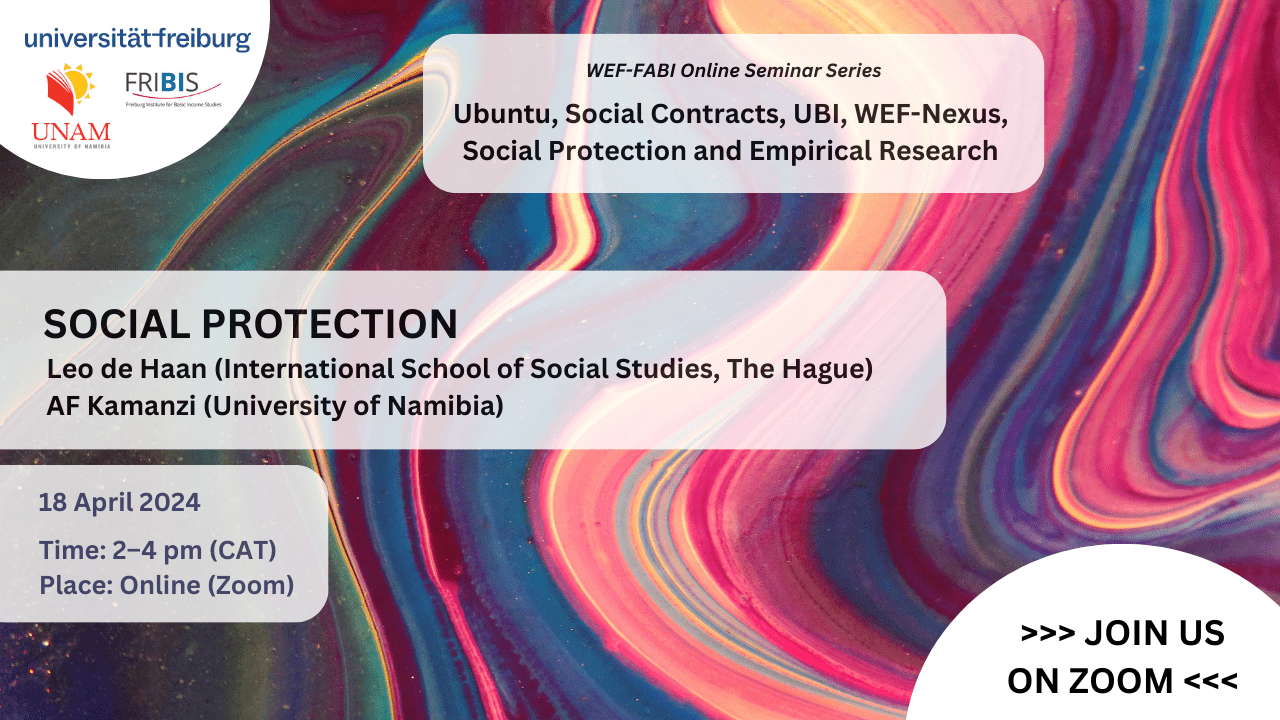
- Diese Veranstaltung hat bereits stattgefunden.
WEF-FABI Online Seminar Series – Social Protection
April 18 @ 2:00 pm - 4:00 pm


Presentation 5: Social Protection
Leo de Haan (International School of Social Studies, The Hague)
AF Kamanzi (University of Namibia)
Social protection, once a peripheral topic in development talks, gained prominence in the late 1990s. Initially seen as too costly for developing nations and primarily benefiting formal sector workers, it evolved with safety net programs emerging in the 1980s to counter the negative effects of structural adjustments. Today, social protection is widely recognized as essential for development, encompassing various elements to enhance livelihoods and address social exclusion. Despite its acceptance, it remains politically contentious. Analyzing key schemes in India, Ethiopia, and Brazil, such as the Mahatma Gandhi National Rural Employment Guarantee Act and Bolsa Familia, highlights efforts to combat social exclusion and promote sustainable livelihoods. However, their effectiveness varies, necessitating evaluation through the lenses of protection, prevention, promotion, and transformation. In practice, social protection programs don’t offer a straightforward path out of poverty but aim to provide a safety net, prevent further impoverishment, and foster transformative change. By assessing these programs’ implementation and outcomes, policymakers can better utilize social protection to advance inclusive development agendas.
Zoom Link: https://uni-freiburg.zoom.us/j/66244057843?pwd=eU5rOTlpSTJjcERmUUVnUWhZYmpDZz09
Ubuntu, Social Contracts, UBI, WEF-Nexus,
Social Protection, and Empirical Research
Together with our partners at UNAM the WEF-FABI TEAM will host an online seminar series on “Ubuntu, Social Contracts, UBI, Water-Energy-Food Nexus, Social Protection, and Empirical Research,” starting on 21/03/2024. With assorted guests, the series will create a path of interconnections and differences between these topics and ask how their elements fit together. We want to examine how Ubuntu can be used in social experiments. Finally, the workshop findings will be incorporated into joint work (e.g. joint papers or field studies).
“Ubuntu” is a bond of unity amongst the people of Africa (Asike 2016, p. 7). In this sense, ubuntu is a philosophy that justifies norms and deliberate rules. With that, it touches common ground with the tradition of the social contract theory. In our series, we will follow various questions connecting these two traditions of thought: What are the main positions in these philosophical traditions? What are the similarities/differences between ubuntu and social contract theory? How can the shared features of the two of them be connected? We will then confront philosophical insights with the idea of a universal basic income and further link the various strings to possible impacts on social policy interactions. We take a look at the trade-offs between different policies and sharpen our awareness of the water-energy-food nexus and social protection. Finally, we will see how we can use empirical methods to normative justify policies and contribute to solving trade-offs.